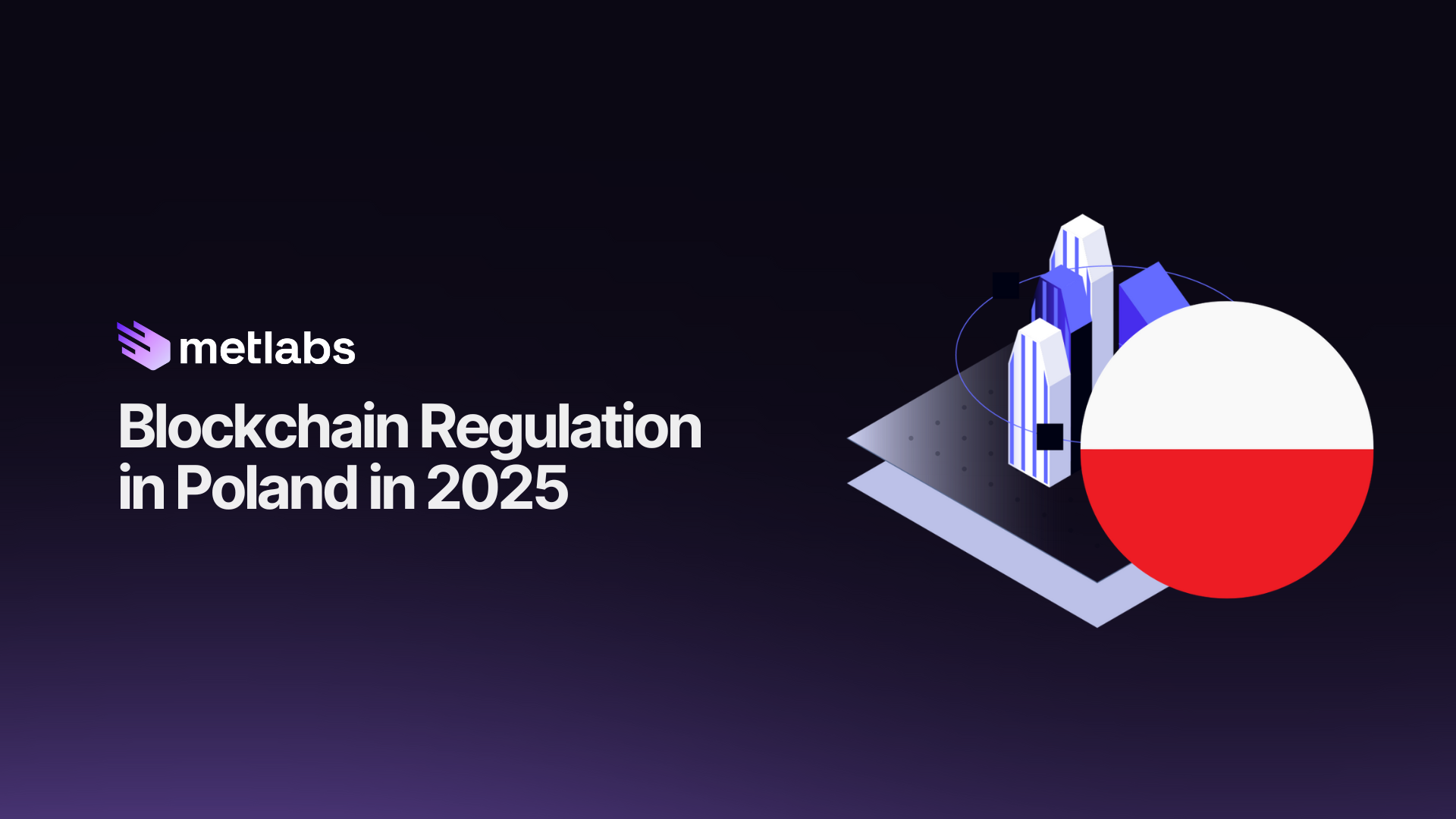The adoption of blockchain technology and asset tokenization is advancing at a rapid pace, but the real engine driving its global development is the existence of a clear, consistent and innovation-friendly legal framework.
Some countries have already established themselves as regulatory benchmarks, establishing specific rules for cryptoassets, DLT infrastructures and token issuance with legal backing. In this article we show you relevant information about blockchain regulation in Poland, which you can use as a guide if you are looking to operate internationally or evaluate different strategic locations.

Current legislation on blockchain and virtual assets in Poland
MiCA Regulation (Markets in Crypto-Assets Regulation)
Establishes the EU’s first comprehensive legal framework for regulating cryptoasset issuers and service providers (CASPs). Covers stablecoins, utility tokens, electronic money tokens (EMTs), asset referenced tokens (ARTs), and custody or exchange platforms. Requires prior authorization, governance requirements, solvency, transparency, and user protection.
MiFID II (Markets in Financial Instruments Directive II)
The MiFID II Directive regulates security tokens and cryptoasset derivatives that qualify as financial instruments in Poland. Platforms offering these assets must obtain investment firm licenses, comply with prudential requirements, and submit to transparency and investor protection rules under the supervision of the KNF.
Polish Prevention of Money Laundering Act
Cryptoasset service providers (VASPs) are subject to the Polish Act on the Prevention of Money Laundering. Since the transposition of AMLD5, they are obliged to register in the national registry, apply KYC (know your customer) procedures, monitor transactions and report to GIIF.
Cryptoassets Sandbox in Poland and DLT Pilot Regime
Poland participates in the European Blockchain Sandbox. The KNF also manages an Innovation Hub that allows blockchain startups and companies to test solutions in asset tokenization, EMT/ART stablecoins and DeFi, in a supervised environment, although they are not formal regulatory sandboxes with legal exemptions. Also, Poland participates in the EU DLT Pilot Regime.
Tokenization makes it possible to digitally represent real-world assets through blockchain, but for it to have legal value, a regulatory framework recognizing this operation is essential. Poland adopts its own approach, establishing specific rules for the issuance, custody or trading of tokens. In this block we explain how asset tokenization is regulated from a legal point of view, taking an advanced jurisdiction such as Poland as an example.
Regulation of asset tokenization in Poland
Asset tokenization in Poland is based on the European legal framework. If the tokens represent financial instruments, such as stocks, bonds or fund shares, they are subject to MiFID II and the supervision of the KNF. These tokens require a license for issuance and trading on regulated markets. On the other hand, utility tokens and stablecoins EMT (electronic money tokens) or ART (asset referenced tokens) are governed by the MiCA Regulation, fully in force since the end of 2024.
Poland is part of the DLT Pilot Regime, which allows operating blockchain-based market infrastructures for trading tokenized financial instruments. Several projects in the country are already exploring this framework to develop secondary markets on DLT. In addition, the KNF promotes participation in the European Blockchain Sandbox, fostering innovation in tokenization and stablecoins.
The tokenization of non-financial assets, such as real estate or art, has no specific regulation, but is legally recognized in private law. Depending on their structure, these tokens may be subject to tax or civil regulation. Registrations in DLT technology have full legal validity in Poland, providing security of transactions and ownership of tokenized assets.
Regulatory bodies and authorities for digital assets in Poland
Financial Supervisory Commission (KNF)
The KNF (Komisji Nadzoru Finansowego) is the leading authority in cryptoasset and blockchain regulation in Poland. It oversees CASPs, token issuance, exchanges, custodians and digital asset markets. It is responsible for licensing under the MiCA Regulation, applying MiFID II to security tokens and ensuring compliance with AML/CFT rules.
National Bank of Poland (NBP)
NBP (Narodowy Bank Polski) participates in studies on the possible issuance of a CBDC and in the assessment of the impact of cryptoassets on financial stability. It collaborates with the KNF in the supervision of stablecoins that may have systemic effects, in aspects such as reserves, liquidity risks and monetary policy.
General Inspectorate for Financial Information (GIIF)
The GIIF (Generalny Inspektor Informacji Finansowej) is Poland’s financial intelligence unit. It monitors compliance with national legislation on the prevention of money laundering and terrorist financing. It manages the VASP register, receives suspicious activity reports and collaborates with the KNF and other authorities on the integrity of the financial system.
Launching a business based on digital assets requires more than just technology: it is also necessary to comply with legal requirements such as licensing, registration and regulatory obligations. These conditions ensure that the business model is viable and sustainable over time, and that it meets transparency and fraud prevention standards. In this section we explore what licenses are typically required and what compliance criteria blockchain companies operating in Poland must follow.

What licenses and requirements are needed to trade cryptoassets in Poland?
CASP License (MiCA)
With the entry into force of the MiCA Regulation, CASP licensing is mandatory for exchanges, custodians, issuers of stablecoins (EMT or ART) and other cryptoasset service providers operating in Poland or the EU. The competent authority for granting prior administrative authorization is the Financial Supervision Commission (KNF), the Polish financial supervisory commission. The KNF also coordinates with the Central Bank of Poland (Narodowy Bank Polski, NBP) in cases of stablecoins with potential impact on financial stability.
Investment Firm License (ESI)
Platforms in Poland that offer derivative financial products on cryptoassets (futures, options, CFDs) must be licensed as Investment Firms under the MiFID II directive, as these products are considered financial instruments. The granting of this license is also the responsibility of the KNF, which supervises the correct application of MiFID II and MiCA in the field of cryptoassets.
AML/KYC Compliance
Crypto companies operating in Poland must comply with the Prevention of Money Laundering and Terrorist Financing Act, which incorporates AMLD5 obligations. This includes KYC processes, transaction monitoring, identification of beneficial owners and reporting suspicious activity to the General Inspectorate for Financial Information (GIIF), the Polish financial intelligence unit. Strict compliance with AML/CFT regulations is mandatory to obtain and retain authorization as a CASP.
Other regulatory requirements
In addition to complying with MiCA and AML/CFT, crypto companies in Poland must apply the provisions of the DORA (Digital Operational Resilience Act) Regulation. This regulation imposes the adoption of ICT risk management policies, cybersecurity, operational continuity plans and digital resilience testing. It also requires oversight of technology providers and adequate training of personnel. Compliance with DORA is indispensable to operate legally in Poland under the MiCA framework.
Are you exploring developing your blockchain project in Poland?
At Metlabs we help companies like yours and offer comprehensive support in the development of blockchain projects and tokenization of assets such as real estate, carbon credits, commodities, intellectual property, financial instruments, franchises and more, fully aligned with blockchain regulation in Poland and international regulatory standards.
Contact us and find out how we can help you meeting all your business model needs, from technical validation and structuring to design, development and implementation of custom blockchain solutions, ready to scale from day one.



